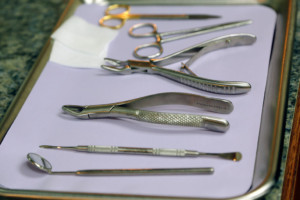 We do all we can to save our teeth. With today’s technology, the chances of saving teeth, are better than ever. On the other hand, we can help you to evaluate the feasibility of saving your teeth. Sometimes, due to Periodontitis and other health issues, it may be more advantageous to have some or all of your teeth extracted and to have them replaced with partial dentures, complete upper and lower dentures or possibly, dental implants.
We do all we can to save our teeth. With today’s technology, the chances of saving teeth, are better than ever. On the other hand, we can help you to evaluate the feasibility of saving your teeth. Sometimes, due to Periodontitis and other health issues, it may be more advantageous to have some or all of your teeth extracted and to have them replaced with partial dentures, complete upper and lower dentures or possibly, dental implants.
If your teeth need to be extracted, we can assist you in choosing a practical treatment plan. The beauty of coming to us is, all of our dental and denture services are offered under one roof, from the initial evaluation and treatment options to actually having your dentures made, having your teeth extracted and having an immediate comfortable smile.
At DK Dental we give all of our new denture candidates a comprehensive evaluation without charge and with absolutely no obligation. At that time, we would want to hear your concerns and answer any questions that you may have. Since some of the services may be new to you, we will carefully explain how the procedures work, appointments involved, time frame and exactly what to expect. After your appointment, if more questions come to mind, we invite you to either reach us by phone or make another appointment. While you are visiting our website, we invite you to check some of the other topics, and most of all to call us for a free comprehensive evaluation.
Wisdom Teeth Extractions
The average adult has 32 teeth. The teeth in the front of the mouth (incisors, canine, and bicuspid teeth) are ideal for grasping and biting food into smaller pieces. The back teeth (molar teeth) are used to grind food up into a consistency suitable for swallowing. The average mouth is able to hold only 28 teeth. It can be painful when 32 teeth try to fit in a mouth that can only accommodate 28! These four other teeth are your third molars, also known as “wisdom teeth.”
Why Should I Have My Wisdom Teeth Removed?
Wisdom teeth are the last teeth to erupt within the mouth. When they align properly and gum tissue is healthy, wisdom teeth do not have to be removed. Unfortunately, this does not generally happen. The extraction of wisdom teeth is necessary when they are prevented from properly erupting within the mouth. They may grow sideways, partially emerge from the gum, and even remain trapped beneath the gum and bone. Impacted teeth can take many positions in the bone as they attempt to find a pathway that will allow them to successfully erupt.
These poorly positioned or impacted teeth can cause many problems. When they are partially erupted, the opening around the teeth allows bacteria to grow and will eventually cause an infection. The result: swelling, stiffness, pain, and illness. The pressure from the erupting wisdom teeth may move other teeth and disrupt the orthodontic or natural alignment of teeth. The most serious problem occurs when tumors or cysts form around the impacted wisdom teeth, resulting in the destruction of the jawbone and healthy teeth. Removal of the offending impacted teeth usually resolves these problems. Early removal is recommended to avoid such future problems and to decrease the surgical risk involved with the procedure.
Oral Examination
With an oral examination and x-rays of the mouth we can evaluate the position of the wisdom teeth and predict if there are present or may cause future problems. Studies have shown that early evaluation and treatment result in a superior outcome for the patient. Patients are generally first evaluated in the mid-teenage years by their dentist, orthodontist or by an oral and maxillofacial surgeon.
All outpatient surgery is performed under appropriate anesthesia to maximize patient comfort.The various options will be discussed at your initial consultation.
Surgery and Anesthesia
The removal of wisdom teeth can be performed under local anesthesia, laughing gas (nitrous oxide/oxygen analgesia) or oral conscious sedation. These options, as well as the surgical risks (i.e., post op and sinus complications), will be discussed with you before the procedure is performed. Once the teeth are removed, the gum is usually sutured. To help control bleeding, bite down on the gauze placed in your mouth. You will rest under our supervision in the office until you are ready to be taken home. Upon discharge, your postoperative kit will include postoperative instructions, prescriptions (if not given at your initial visit), gauze and a follow-up appointment in one week if necessary.
